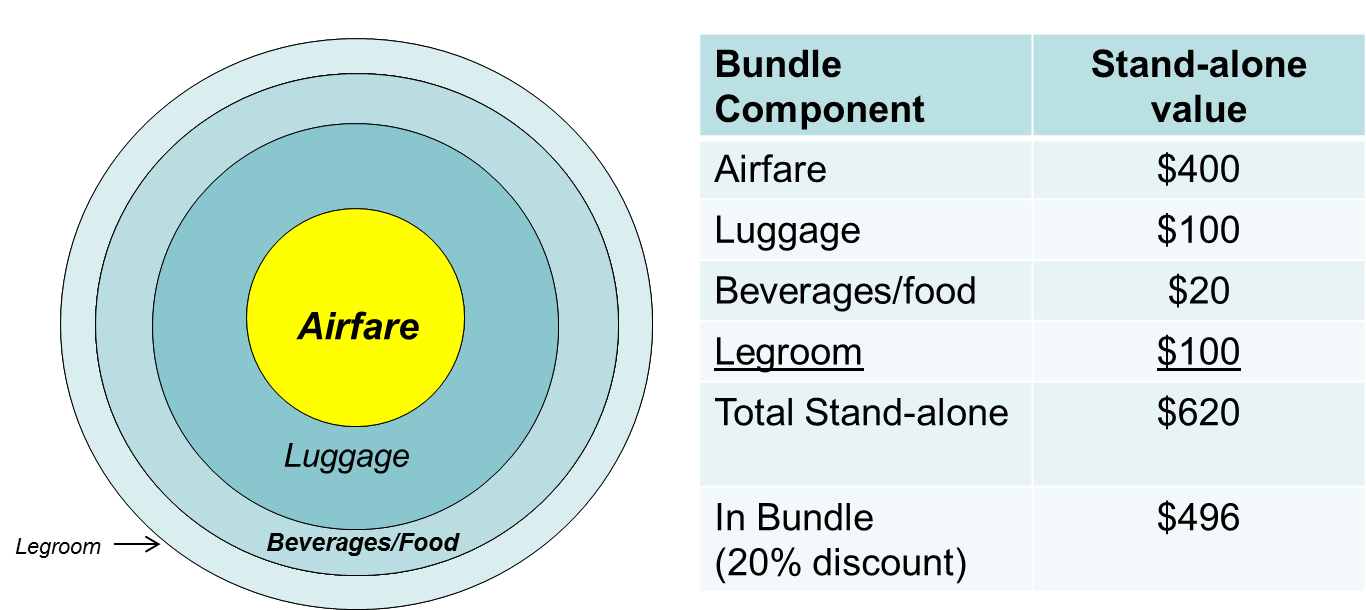With the summer travel season behind us, we thought it would be interesting to analyse the pricing strategy of Spirit Airlines. Here you have an airline that defies common sense: As Business Week* puts it, “the most hated airline is also the most profitable.” How can this be?
 Let’s first look at the profitability part of the equation. Spirit is a disrupter, the ultimate un-bundler of the airline industry. While most airlines sell you a bundle of transportation, luggage, non-alcoholic beverages, etc., Spirit charges a la carte for everything, including carry-on bags and bottled water. So why is this so profitable?
Let’s first look at the profitability part of the equation. Spirit is a disrupter, the ultimate un-bundler of the airline industry. While most airlines sell you a bundle of transportation, luggage, non-alcoholic beverages, etc., Spirit charges a la carte for everything, including carry-on bags and bottled water. So why is this so profitable?
Because if you don’t bundle, you don’t need to give a bundle discount. Bundle discounts are given to compensate buyers for “forcing” them to buy elements in a bundle they don’t really need or want. The motivation for companies to bundle is usually to crowd out competitors and to generate more sales volume and revenue, but at lower profit margins.
As the below illustration shows, most traditional airlines sell you a bundle. Bundles have a taxonomy, with a core (airfare), strong add-ons (luggage) and marginal add-ons (Beverages/food, legroom, etc.). These components have a stand-alone value, but when sold in a bundle, often need to be discounted (in this illustration by a total of 20%) for the reasons given above (example: “I don’t have luggage and bring my own water, why pay for it.”)
Spirit Airlines decided not to bundle and thereby provides a cheaper airfare ($400 vs. $496 at traditional airlines) while generating highly profitable add-on sales for other parts of the traditional bundle. These fees make up 38.4% of total revenue, most of it from luggage fees**.
Why is Spirit so hated? Besides the well documents poor levels of service and on-time performance, we believe it is because its pricing is not communicated clearly enough at point of purchase, thereby resulting in ill-informed customers ending up paying more than on full service airlines.
The lesson is that transformational pricing requires exceptional communication efforts. This is especially important when the pricing is radically different from industry norms.
If not done right, you may be highly profitable (on the backs of unsuspecting customers), but also earn the title of the “most hated airline.”
Safe travels, everyone.
*http://www.businessweek.com/articles/2014-04-10/the-most-hated-u-dot-s-dot-airline-is-also-the-most-profitable
**http://www.telegraph.co.uk/travel/travelnews/10980310/Wizz-Air-and-Jet2.com-worse-than-Ryanair-for-extras.html

